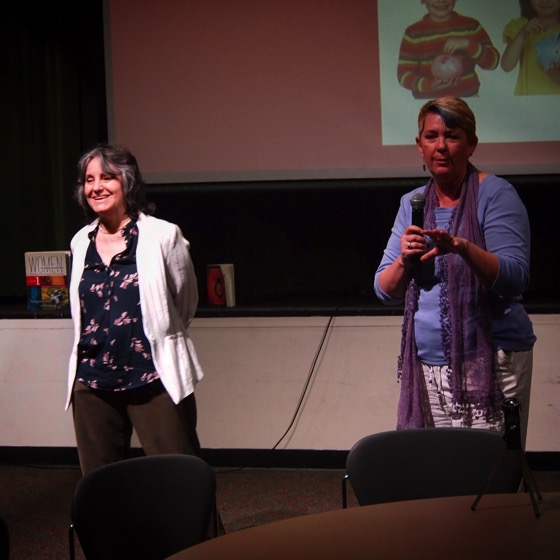Watch this entire presentation
Transcript:
So then we come to the television show, which stars Sally Field. This was her first major job. She’d never done a film or anything large before, so she is the active character in every episode which is the thing that we do in television so maybe that helped Ruth bring the story back to being about Gidget’s decisions. I don’t know, but I am sure that contributed to it and later in her career Flippen is going to write these other “plucky” women. That Girl being the first single woman on television to live without her parents and have a career. We always think about Mary Tyler Moore who did that but it was That Girl who did it first and her career was acting so that wasn’t taken quite seriously but she lived on her own. She supported herself, right? And Bewitched who, of course, had the power of magic and always ended up saving the day for her husband and I would say maybe see the Brady girls had some power in their lives — they brought Davy Jones into their world, so that’s a big deal. So I think it’s interesting that she always wrote female characters that are well remembered.
At this year’s 10th Annual Screenwriting Research Network Conference at Otago University in Dunedin, New Zealand I presented…
“How Gidget Got Into the Girl Ghetto by Accident (and How We Can Get Her Out of it): Demoting Gidget: The Little Girl with Big Ideas from Edgy Coming of Age Novel to Babe on the Beach Genre Film via Choices made in the Adaptation Process.”
It’ a long title, as I joke up front, but covers the process of adapting the true life story of Kathy Kohner (nicknamed ‘Gidget’ by the group of male surfers who she spent the summers with in Malibu in the 1950s) into the film and television series that are better remembered than the novel. The novel had been well-received upon publication, even compared to A Catcher in the Rye, but has mistakenly been relegated to the ‘girl ghetto’ of films. Some of the adaptations turned the focus away from the coming of age story of a young woman who gained respect for her talent at a male craft – surfing – and instead turned the focus far too much on Kathy being boy crazy.
Along the way I found interesting comparisons between how female writers treated the main character while adapting the novel and how male writers treated the character.
Dr. Rosanne Welch
Dr. Rosanne Welch teaches the History of Screenwriting and One-Hour Drama for the Stephens College MFA in Screenwriting.
Writing/producing credits include Beverly Hills 90210, Picket Fences, ABCNEWS: Nightline and Touched by an Angel. In 2016 she published the book Why The Monkees Matter: Teenagers, Television and American Pop; co-edited Women in American History: A Social, Political, and Cultural Encyclopedia; and placed “Transmitting Culture Transnationally Via the Characterization of Parents in Police Procedurals” in the New Review of Film and Television Studies. Essays appear in Torchwood Declassified: Investigating Mainstream Cult Television and Doctor Who and Race: An Anthology. Welch serves as Book Reviews editor for Journal of Screenwriting and on the Editorial Advisory Board for Written By magazine, the magazine of the Writers Guild.
Watch Dr. Welch’s talk “The Importance of Having a Female Voice in the Room” at the 2016 TEDxCPP.
The Screenwriting Research Network is a research group consisting of scholars, reflective practitioners and practice-based researchers interested in research on screenwriting. The aim is to rethink the screenplay in relation to its histories, theories, values and creative practices.
Podcast: Play in new window | Download
Subscribe: RSS
![11 Gidget On Television from How Gidget Got Into the Girl Ghetto [Video] (0:58) – Dr. Rosanne Welch – SRN Conference 2017](https://rosannewelch.com/wp-content/uploads/2018/03/gidget-srn-11-gidget-tv.jpeg)


![01 Generation and Regeneration from Gender Diversity in the Who-niverse with Dr. Rosanne Welch [Video] (1:01)](https://rosannewelch.com/wp-content/uploads/2018/03/gender-dw-01.jpeg)
![10 Gidget Grows Up from How Gidget Got Into the Girl Ghetto [Video] (0:44) – Dr. Rosanne Welch – SRN Conference](https://rosannewelch.com/wp-content/uploads/2018/02/gidget-srn-10-gidget-grows-up.jpeg)
![Gender Diversity in the Who-niverse: Paving the Way for a Lady Doctor with Dr. Rosanne Welch [Video] (36:58)](https://rosannewelch.com/wp-content/uploads/2018/02/gender-diversity-doctor-who.jpeg)
![09 Writers and Story on the Gidget Movies from How Gidget Got Into the Girl Ghetto [Video] (0:55) – Dr. Rosanne Welch – SRN Conference](https://rosannewelch.com/wp-content/uploads/2018/02/gidget-srn-09-writers-movies.jpeg)
![Reading, Writing and Resources from Giving Voice to Silent Films and the Far From Silent Women Who Wrote Them with Dr. Rosanne Welch [Video]](https://rosannewelch.com/wp-content/uploads/2018/02/ufva-20-reading-writing.jpeg)









 and Follow
and Follow









![Representation Matters from Giving Voice to Silent Films and the Far From Silent Women Who Wrote Them with Dr. Rosanne Welch [Video]](https://rosannewelch.com/wp-content/uploads/2018/02/ufva-19-rey-leia.jpeg)